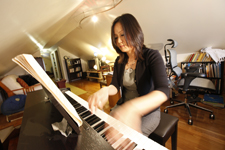Epstein and Chang win fellowships at Radcliffe Institute for Advanced Study

Can chemical reactions help explain social interactions among humans? Professor Irving Epstein of Brandeis’ chemistry department plans to explore that question during the 2010-2011 academic year at the Radcliffe Institute for Advanced Study at Harvard.
He is one of two Brandeis faculty members selected as Radcliffe Fellows, who will spend the year working within and across academic disciplines.
Professor Epstein explains complicated chemical reactions in simple terms, saying that when a drop of red ink is plopped into a cup of water a reaction takes place called “diffusion."
"The initial spot will spread out and mix, so instead of a red spot standing alone, the water will turn pink,” Epstein explains, noting that this reaction can be altered if there is “cross diffusion” -- that is, the dripping of more than one ink color into a cup, or more than one chemical. This, he says, can lead to interesting formations of patterns.
Scientists see this in the animal world, Epstein says: “Foxes alone spread randomly, but with rabbits, they concentrate near rabbits, while the rabbits flee the foxes and cluster elsewhere."
This, he thinks, also may apply to ‘White Flight”, when white neighborhoods clear out as other groups move in. “There may be racial, economic and social reasons why people prefer to live near some people and not to live near other people, “ he suggests, “and this may lead to patterns of housing segregation and economic and social segregation.”
Epstein, who received his BA, MA and PhD at Harvard University, is the Henry F. Fischbach Professor of Chemistry at Brandeis.
He will be joined at Radcliffe by Yu-Hui Chang, Associate Professor of Composition in Brandeis’s music department.
Chang, a native of Taiwan, has received commissions from several foundations, and plans to spend her year focusing on completing three compositions.In keeping with the cross-disciplinary nature of the Radcliff program, she will collaborate with a poet from the Wellesley College faculty setting a poem to music she will compose.
Chang says it is always a mistake to try to write poetry to go with a musical composition. “Some people do that and they butcher the poetry,” she says; it has to be done the other way around, with the poetry coming first. “Poetry has its own rhythm and narrative. The music can’t go against that. Once I find a perfect poem, I will write the music for it. I call it ‘Musical Interpretation of a Poem’.”
The completed piece, co-commissioned by the Barlow Endowment and the Triple Helix Piano Trio is to receive its premiere by the Triple Helix and the Wellesley College Chamber Singers in April 2011.
That same month Yu-Hui is scheduled to premier a new piece commissioned by Meet the Composer for a festival in New York City. Written for Music from China, this piece will combine Western and Chinese instruments.
Her third focus of concentration will be on completion of a commission by cellist Rhonda Rider that is to debut in February 2011. This solo cello piece must capture a decidedly expansive theme: The Grand Canyon.
She adds the Radcliffe Fellowship to earlier fellowships from the Guggenheim Foundation and the American Academy of Arts and Letters. She has also won the Aaron Copland Award and the Yoshiro Irino Memorial Prize.
Chang started to pursue composition as a career at age fourteen. After receiving her Bachelor of Fine Arts degree from the National Taiwan Normal University, she came to the United States, where she received her master's in music at Boston University and her Ph.D. at Brandeis. She is currently Associate Professor of Composition in the Brandeis music department.





